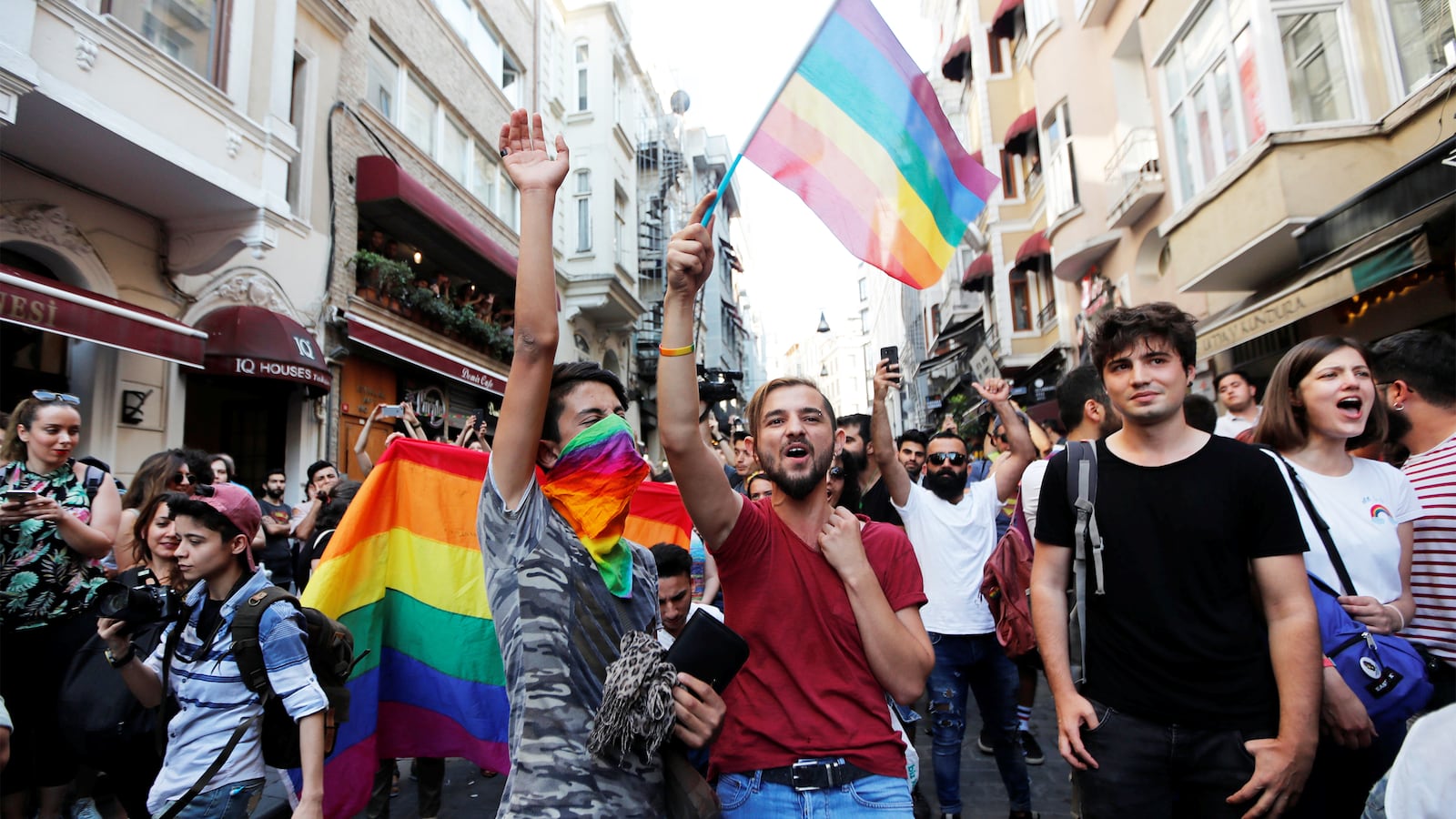ISTANBUL — As dusk approached on Sunday, the streets filled with smiling faces that sparkled with glitter, along with ululating pop music and drums. All around, rainbow flags fluttered in the sky as the crowd gathered. “Don’t be quiet, don’t shut up, shout, homosexuals exist,” they shouted
On both sides of the peaceful, joyful crowd stood lines of police in riot gear, waiting with their shields add batons, the tension building.
An estimated 1,000 protesters advocating gay rights clashed with Turkish security forces in Istanbul in an attempt to defy a ban on the annual LGBT Pride Parade.
At least 11 people were reported arrested, according to lawyers and activists, as police fired teargas along the city’s most famous commercial street. The police also fired rubber bullets, according to The Times of Israel and ITV News.
The protesters could claim a measure of victory. Thanks to negotiations between organizers and police, protesters could gather on a side-street, waving rainbow flags and chanting, even as they were barred from marching.
“This is the fourth year we are getting banned and attacked from the police,” said Hakan, a 27-year-old employee of an aid organization who asked that his last name not be published.
“Being LGBTI is getting harder. We are part of the society and we are here saying we want rights like all minorities. But today, they don’t even let us enter the street because of the way look and because we are carrying rainbow flags. We are saying we are here, we are part of the community, and we are queer.”
In a press statement, Pride organizers said, “We LGBTI+ (lesbian, gay, bisexual, transgender, intersex) are here with our pride despite all vain attempts to prevent us and we do not recognize this ban.”
Sunday’s protest marked the first high-profile confrontation between the government of Turkey’s leader, Recep Tayyip Erdogan, and his cultural and political opponents since he won the June 24 election that gave him enhanced powers as the nation's first executive president.
Some had hoped that Erdogan’s victory and five-year term might give him the leeeway to ease up on dissidents and civil society activists who oppose his vision for Turkey, and who have been jailed or purged from their jobs.
The decision to ban the Pride Parade and the harsh response by security forces suggest Erdogan will continue what his critics have described as an authoritarian path.
Istanbul's annual pride march was once considered a shining example of tolerance for the LGBTI community in the Muslim world.
Pride became a colorful and vibrant annual party, with hundreds taking the pedestrian-only throughway Istiklal Street in Turkey’s commercial and cultural capital.
As mayor of Istanbul and leader of Turkey, Erdogan used to boast about the march as a symbol of the country’s cosmopolitanism and tolerance.
But beginning in 2015, he and his Islamist-rooted political party began cracking down on the march, dismaying civil rights activists as well as LGBT advocates.
At first, Istanbul banned the march over what it described as security worries amid a spate of large-scale terrorist attacks that struck the city. Then it cited the march’s coincidence with the Holy month of Ramadan.
This year, the march fell well after Ramdan, yet authorities continued the ban, informing organizers mid-week that they had no permission to march over what was described as public “sensitivities.”
Protesters were undeterred. They came with rainbow banners. They blasted Lady Gaga on portable stereos. They danced in the street.
Police sought to avert confrontations by allowing a small protest along the street that included a speech. But the numbers continued to swell, as groups of mostly young protesters came streaming in, defying the armed, black-clad cops looming along Istiklal and the narrow side streets.
“We have no visibility in any space – in the workplace, many LGBTIQ people have to cover their gender or their sexual orientation, said Meriç Aytekin, an activist from the Pride Committee. “Or in the education system, they have to cover themselves. And this [Pride] is the only one intensive place to come out, to show yourself, what you are, what you like, and what you love, you know? And the visibility helps us change the political system, to change the law.”
As protesters sought to move onto the main street, a melée ensued. Police in riot gear, along with police dogs and armored vehicles ordered protesters to disperse. But the crowd continued to move.
Then came the pop-pop of teargas canisters shot at the crowd. Protesters, along with passersby, began to run attempting to stay together while the police tried to herd them into separate smaller streets.
Police followed protesters, menacing them with threats, while occasionally grabbing demonstrators, pulling them into awaiting vans, or hitting them if they resisted.
“Did you see?” said Selcan Gorgun, a 27-year-old trans woman who works in IT, as she watched a woman being pulled away and beaten, her eyes filling with tears. “I can’t believe that much force on a girl. Policemen are using force and they are beating women. Policemen are using violence on women and they are not ashamed of it. They are not ashamed.”
As the evening wore on, police fanned out along Istiklal, blocking entrances to both the avenue and the side streets. They appeared to be stopping anyone wearing bright colors, carrying a rainbow, or sporting an asymmetrical haircut.
Organizers called march this year a success, despite the crackdown. Tulya Bekisoglu, a 20-year-old member of the Pride Committee and an artist, said more people attended this year than last year.
“I see more young people coming out and I see more people identifying themselves not only with the visible identities,” she said. “Even in high school and primary school they have started identifying themselves more specifically and that makes me happy and excited for the future.”






